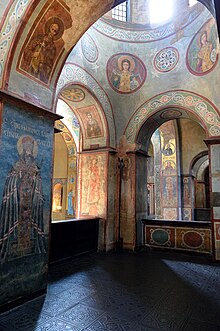Religion in Ukraine (2024)[1]

| Part of a series on the |
| Culture of Ukraine |
|---|
 |
| Cuisine |
Christianity is the predominant religion in Ukraine, with 85% of the population identifying as Christian according to a 2022 survey conducted by the Kyiv International Institute of Sociology (KIIS). Seventy-two percent of the population avowed fidelity to an Eastern Orthodox Church: 54% of Ukrainians proclaimed adherence to the autocephalous Orthodox Church of Ukraine; 14% identified as Orthodox Christian without specifying a church affiliation; 4% associated with the Moscow Patriarchate. Another 9% of Ukrainians professed devotion to the Catholic Church in Ukraine: 8% Ukrainian Greek Catholics and 1% Latin Catholics. Two percent of the population declared affiliation to a mainstream Protestant Church, and a further 2% identified with some alternative sect of Christianity.[1]
Ten percent of Ukrainians identified as atheists. With Christianity in Ukraine overwhelmingly predominant, representative statistical samples of the population surveyed by KIIS in 2020, 2021, and 2022 reported 0% of respondents identifying with Judaism and Islam. An older survey by the Razumkov Center in 2018 estimated Jews in Ukraine at 0.4% of the population, with smaller 0.1% minorities following Hinduism, Buddhism and Paganism (Rodnovery).[2] According to the surveys conducted by Razumkov in the 2000s and early 2010s, such proportions have remained relatively constant throughout the last decade, while the proportion of believers overall has decreased from 76% in 2014 to 70% in 2016 and 72% in 2018.[2][3]
As of 2022, Christianity was particularly strong in westernmost Ukrainian regions, where most Greek Catholics lived. In central, southern and eastern regions, Christians constitute a smaller proportion of the total population, particularly low in the easternmost region of Donbas.[3] Another religion that is present in Ukraine besides Christianity is Rodnovery (Slavic native faith), which comprises Ukrainian- and Russian-language communities (some Rodnover organizations call the religion Orthodoxy (Ukrainian: Правосла́в'я, romanized: Pravoslávʺya), thus functioning in homonymy with Christian Orthodox churches).[4][5]
Crimean Tatars professing Islam represent a significant part of the population in Crimea, which prior to 2014 was a subject of Ukraine, but has been since that year occupied by Russia. As of 2016, without Crimea, where Muslims formed 15% of the population in 2013,[6] only Donbas maintains a larger community of Muslims compared to other Ukrainian regions (6%).[3]
Since before the outbreak of the war in Donbas in 2014, but even more violently so from that year onward, there has been unrest between pro-Ukrainian and pro-Russian religious groups in the country.
After the 2022 Russian invasion of Ukraine, Ukraine President Volodymyr Zelenskyy "signed a decree enacting a National Security and Defense Council decision to impose personal sanctions against representatives of religious organizations associated with Russia".[7] Ukraine's government will specifically examine the Ukrainian Orthodox Church of the Moscow Patriarchate and ban any activities relating to pro-Russian movement.
- ^ a b Cite error: The named reference
KIIS2022was invoked but never defined (see the help page). - ^ a b Особливості Релігійного І Церковно-Релігійного Самовизначення Українських Громадян: Тенденції 2010–2018 [Features of Religious and Church – Religious Self-Determination of Ukrainian Citizens: Trends 2010–2018] (PDF) (in Ukrainian), Kyiv: Razumkov Center in collaboration with the All-Ukrainian Council of Churches, 22 April 2018, pp. 12, 13, 16, 31, archived (PDF) from the original on 2018-04-26
Sample of 2,018 respondents aged 18 years and over, interviewed 23–28 March 2018 in all regions of Ukraine except Crimea and the occupied territories of the Donetsk and Lugansk regions. - ^ a b c Релігія, Церква, суспільство і держава: два роки після Майдану [Religion, Church, Society and State: Two Years after Maidan] (PDF) (in Ukrainian), Kyiv: Razumkov Center in collaboration with the All-Ukrainian Council of Churches, 26 May 2016, pp. 22, 27, 29, 31, archived (PDF) from the original on 2017-04-22
Sample of 2,018 respondents aged 18 years and over, interviewed 25–30 March 2016 in all regions of Ukraine except Crimea and the occupied territories of the Donetsk and Lugansk regions. - ^ Proshak, Vitaliy Valentynovych (2006). "Paganism in Ukraine: Its Beliefs, Encounter with Christianity, and Survival". Theological Reflections (7), 2006. p. 145
- ^ Kolesnychenko, Tetiana. "Non-Christian Orthodox believers". Den' (День), day.kyiv.ua, 28 November 2006. Retrieved 1 May 2017.
- ^ "Public Opinion Survey Residents of the Autonomous Republic of Crimea" (PDF)., The sample consisted of 1,200 permanent Crimea residents older than the age of 18 and eligible to vote and is representative of the general population by age, gender, education and religion.
- ^ "Ukraine bans religious organizations with links to Russia". AP NEWS. 2022-12-02. Retrieved 2022-12-12.
Cite error: There are <ref group=lower-alpha> tags or {{efn}} templates on this page, but the references will not show without a {{reflist|group=lower-alpha}} template or {{notelist}} template (see the help page).